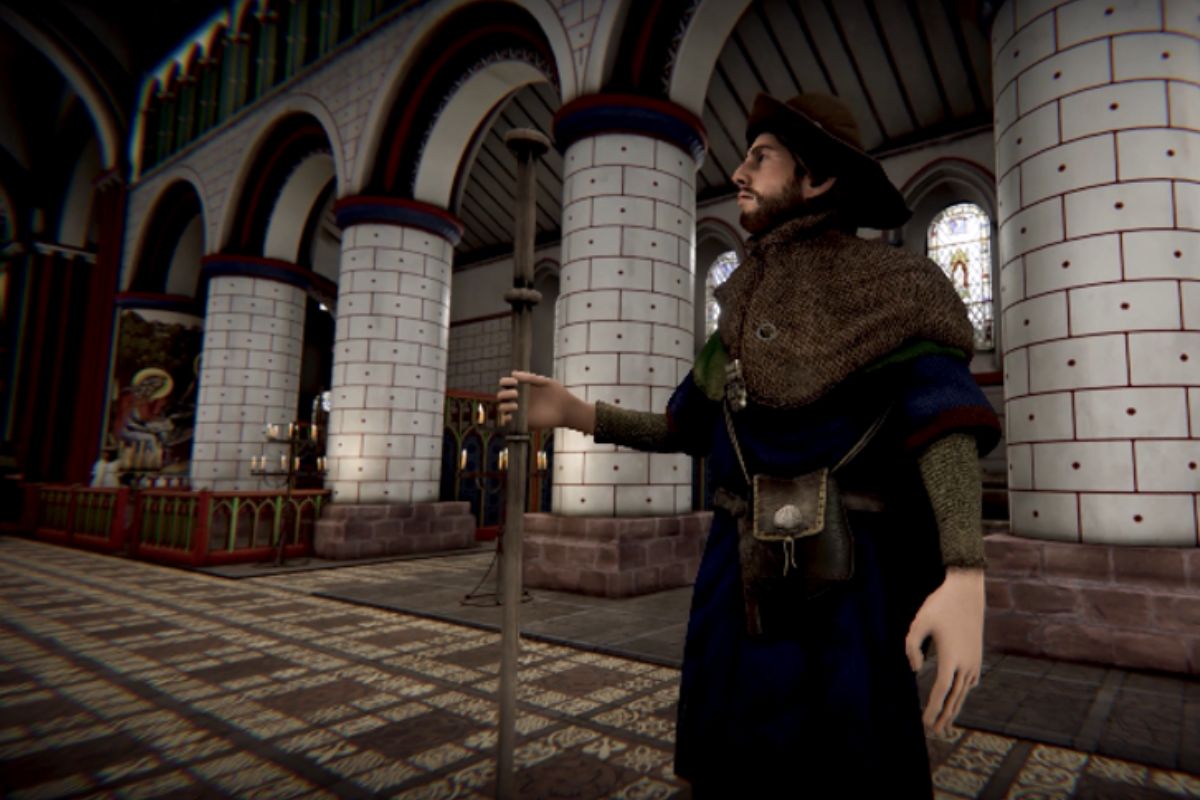How University’s VR project is making access to historical treasures easier
Showcasing hidden treasures at museums and historical sites could soon be made much easier thanks to help from a University of Chester digital project.

Dr Helen Southall, Senior Lecturer in the School of Computer and Engineering Sciences, has been working with Katherine Wilson, Professor of Later Medieval European History, and local Virtual Reality (VR) creator Martin Moss of DextraVisual on bringing the past to life through immersive 3D environments.
Having taught courses on user experience design, Helen is aiming to make the VR experience more accessible for a wider range of historical attractions, especially smaller and less-funded locations which normally would not have spare resources to allocate on expensive VR testing.
While her university role is in Computer Science, Helen also has a background in music and history. This led to a PhD research project on the live dance bands that operated in the Chester and North Wales area in the mid-20th century, and then to collaborations with the History team, particularly Professor Katherine Wilson, as well as colleagues from the Grosvenor Museum and elsewhere.
A portion of an Arts and Humanities Research Council (AHRC) grant enabled the team’s creation of detailed VR reconstructions of sites in 14th century Chester such as St John’s Church, which were included in an exhibition which ran at the Grosvenor Museum and Chester Cathedral in 2022. Those reconstructions were later adapted for use in VR headsets and tested with members of the public.
Helen explained: “Creating really good VR that works for a wide range of visitors – taking into account things like age, languages and disabilities, for instance – can be expensive, and requires specific skills and expertise. Smaller regional museums and sites often have important collections of historic relics and records, and staff who are highly expert on the relevant historical topics. However, they may lack the funds and technical resources to specify or produce enjoyable VR experiences.
“With the public increasingly expecting to see computer game-quality animations as part of everyday life, there’s a demand for the technology to be used in historical attractions as well. Katherine and I realised that there was a gap in the research, and chose to focus on how small regional museums and historical sites could make effective use of VR technology, starting with how they could avoid expensive mistakes by running public usability tests early on in the production process.”
Helen was able to present the team’s results at the inaugural ARCHERIX (Archaeology and Cultural Heritage through Xtended Reality) workshop, held at the IEEE VR Conference at St Malo this year, meeting researchers in this field from around the globe.
Helen added: “I spent a very interesting day hearing about other research on how VR, AR (Augmented Reality) and other extended reality technologies are being used by researchers from all around the world, including virtually reconstructing ancient quarries in France, designing a group VR activity for learning about life in ancient Rome, and producing a virtual reality training school for gladiators.”
Now Helen and Katherine – along with colleague Dr Lee Beever, an expert on computer games design – are working with PhD student Jess Vining, who is researching the topic of Touching Heritage: Providing Access to Cultural Heritage. Jess is working with historical artefacts provided by Dr Elizabeth Montgomery of Chester’s Grosvenor Museum, looking at how they can best be digitised and made accessible to those who cannot visit the stores where the objects are usually held.
Helen explained Jess would be “looking at how museums and historic sites around the world are increasingly making use of VR and similar techniques, and what works best for regional institutions such as the Grosvenor Museum.”
Katherine said: “It is fantastic to see the way the important subject of History based on historical research can be brought to life for the public through these new technologies. We are especially delighted to further shed light on the rich medieval History of Chester.”
For more information about studying Computer Science at the University of Chester, visit: https://www.chester.ac.uk/study/course-search/computer-science-bsc-hons/ and for History visit https://www.chester.ac.uk/study/course-search/history-ba-hons/